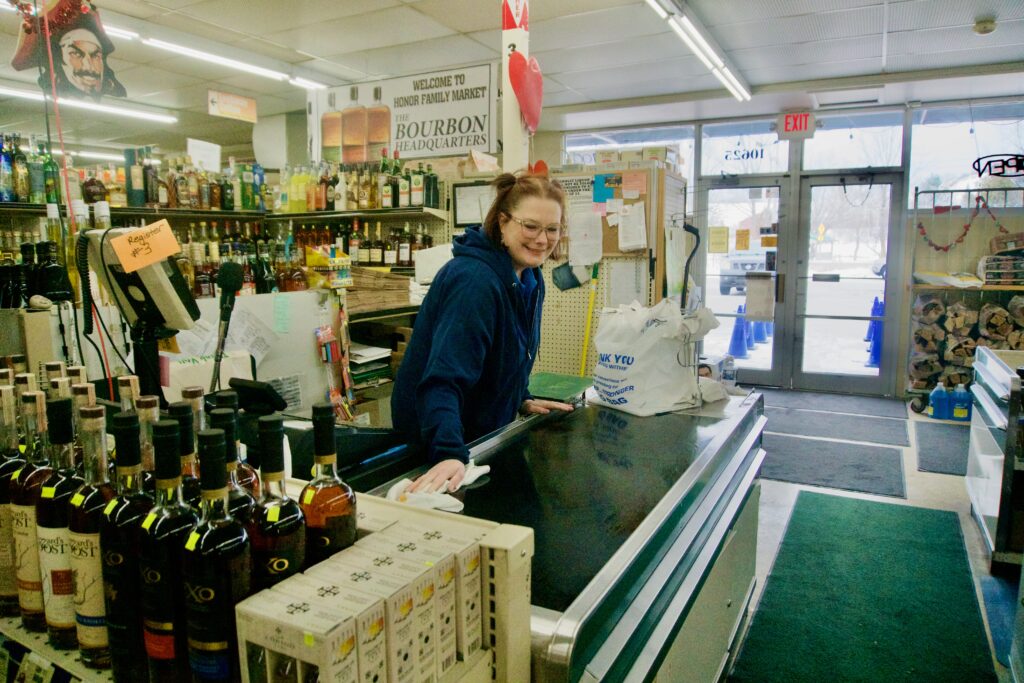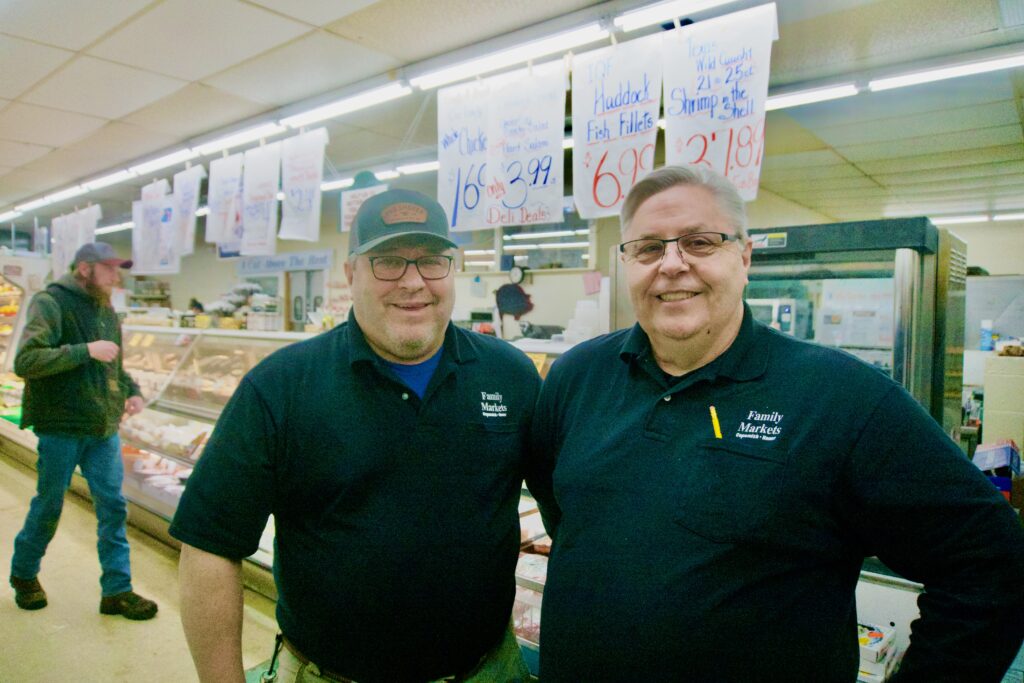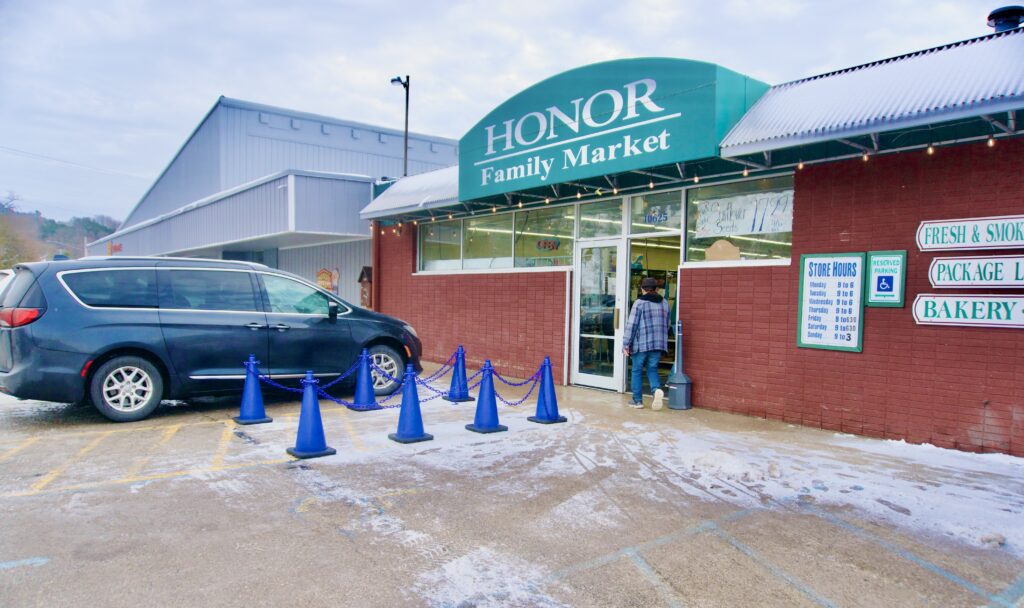
where she worked for a time in the 1990s. (Photo/Keith Schneider)
HONOR, MI – The choreography inside a small independent rural grocery store is on display daily at Honor Family Market. Tim Schneider, one of four siblings that own and manage the store, stacks packaged goods in one of the seven aisles. Younger brother Patrick Schneider prepares prime cuts of beef and homemade sausage. A sister, Marilyn Edginton, oversees the bakery. Her younger sister, Helen Schneider, manages the produce department, and oversees accounts, ordering, and payroll in the office.
Because it’s the only market in town, it has an outsize role in this community of 330 residents. The 12,000-square-foot store, its shelves filled with local products like honey, baked goods and homemade bratwursts, is not only a place where people — in Honor and elsewhere in Benzie County — go to buy meat, wine, beer, and produce. It’s also where they can go to get free — or at a reduced cost — food and supplies for community events like football games or the annual National Coho Salmon Festival in the summer.
“It’s paramount for a healthy, living, breathing community,” said Ingemar Johansson, a resident and president of Honor Area Restoration Project, a non-profit business development group. “Everybody shops there. You run into somebody you know everytime you go.”
The store employs nine full and nine part-time workers, and hundreds of Honor’s high school students have worked their first jobs there, sweeping the well-worn linoleum floor, stacking groceries in the narrow aisles, or bagging at the three checkout lanes. The market’s location in the small shopping plaza along U.S. 31 makes the market convenient to hundreds of workers who commute between Benzie and Traverse City.
“We’re an independent grocery store, the only one in the region, that knows its customers and what they want,” said Tim Schneider. “The value of our store is the fact that it’s close to a lot of people in how they live, and where they live.”

Confronting Big Trend in Grocery Economy
How long the Honor market remains a local institution, though, is far from assured. The Schneiders, who range in age from 63-year-old Patrick to 76-year-old Marilyn, are ready to join the mammoth tide of 9 million Baby Boom business owners that are retiring. They hope to keep the store independent, a herculean task during a time of industry consolidation that have pushed up grocery prices.
Curtis D. Kuttnauer, managing director of Golden Circle Advisors, a Traverse City-based investment bank that specializes in selling small businesses, said the Schneider’s goal is impeded by powerful headwinds in and outside northern Michigan, including consolidation in the grocery sector, tight lending for low margin businesses, and the well-researched difficulty of selling small rural businesses.
Keeping Honor Market independent, in effect, requires a buyer who is willing to not only take on the tight margins of a small business but also compete against the giant chains. The Dollar Tree next door competes for sales of toiletries, paper goods, detergent and snacks.
“Three quarters of all businesses put on the market don’t sell,” said Mr. Kuttnauer. “What makes rural businesses more difficult to sell is that most need to be operated locally. Being rural limits the pool of buyers.”
From 1990 to 2015, the number of independent grocery stores in the United States dropped 39 percent, to 2,648, with an average of 30 store closings a year, according to a 2021 report by the U.S. Department of Agriculture. That suggests there are roughly 300 fewer stores today than in 2015. Virtually all operate within tight margins in a hypercompetitive $846 billion industry in which a significant portion of all grocery sales goes to just four companies: Walmart, Kroger, Costco and Albertsons.

Weakening Competition, Hurting Small Grocers
The Schneiders have certainly felt the whip of consolidation. The number of wholesale food distributors that served their grocery in the 1990s diminished from seven in the region to one in Grand Rapids, owned by Spartan Foods, which owns and operates two Family Fare chain stores in Benzie County and 79 other grocery stores in Michigan. Honor Market is captive to its pricing.
“Walmart doesn’t want to sell to me; Meijer only does its own stores,” Mr. Schneider said. “Spartan is pretty much it.”
“It’s a big challenge,” said Rial Carver, who directs the Rural Grocery Initiative at Kansas State University. “Rural grocers have fewer options for stocking their stores and they are at a competitive disadvantage with supercenters and discount retailers. We’ve seen the number of independent grocers have dropped 15 percent over the last decade or so.”
The industry’s concentration, economists have said, was allowed to happen largely by decades of weak enforcement of antitrust laws, particularly the Robinson-Patman Act of 1936, which forbids price discrimination that could wipe out competition in an industry.
“For the next almost 50 years, the Federal Trade Commission vigorously enforced the law,” said Stacy Mitchell, an expert in monopolies and a co-executive director of the Institute for Local Self-Reliance, a nonprofit group that provides technical support to communities for sustainable development. “For all those decades, the market structure was about half independent grocers and about half chains.”
But that started to change in the 1980s, when the F.T.C. “suspended enforcement,” Ms. Mitchell said, because the Reagan administration and several other administrations that followed saw improving efficiency with larger groceries as a priority over ensuring competition.

is another essential profit center. (Photo/Keith Schneider)
Resolve to Stay Open
The Schneiders are experts in navigating the changing economic landscape of the grocery sector. They were were raised in the business by their father, a career food service manager. They bought their first grocery store in 1980 in Copemish, a similarly tiny town 15 miles south of Honor, for $175,000. They bought the store in Honor in 1992, for $400,000.
Slower sales during the pandemic, and the family’s desire to shrink their scope of work, prompted the Copemish store to close in 2021. It, too, did not sell. The family retained ownership of the 15,000-square-foot building that now serves as a vehicle warehouse for Crystal Mountain Resort, the county’s largest private employer.
The family also put the Honor store on the market in 2021 – now listed for $1.1 million – and hired and fired three brokers. The lone buyer who expressed interest failed to show up at closing in 2023 because of a lack of funds.
The Schneiders say the market resistance is surprising, given the sturdiness of the economy in Benzie County and across the rural northern counties close to Lake Michigan.
Since the start of the century the county’s population has increased about 15 percent to over 18,000. Many of the new residents, who arrived during and after the pandemic, are wealthier members of the Baby Boom and Gen X. Winter unemployment, which soared to 19 percent in the early 1990s, dropped to 6 percent earlier this year, according to the Federal Reserve Bank of St. Louis. Since 2019 the county has added nearly 400 new jobs, an 8 percent increase, and is among the five fastest growing labor markets in the state, according to the U.S. Bureau of Labor Statistics.
Not that long ago, household incomes in Honor were under $45,000 a year, most residents were graying and the largest building in the worn business district was an abandoned turn-of-the-20th-century Masonic Lodge.
The village now is a display of the stronger economy. The dilapidated lodge is gone, replaced by town homes. A 52-acre, $1 million town park — paid for with state, foundation and donor funds — opened last summer along the banks of the Platte River, which flows through the village. In September, TrueNorth, an Ohio-based company, opened a gas station and convenience store, and a new coffee shop, Weldon Coffee, also opened. In November, Sleeping Bear Motor Sports, a motorcycle and recreational vehicle dealer, moved to a newly renovated building in Honor.

Even two of Honor’s specialty businesses, the Cherry Bowl Drive-In Theater, one of the last of Michigan’s outdoor movie theaters, and Field Crafts, a screen printer, completed sales last year to new owners.
For 33 years the Schneiders’ full service market has served enough essential purposes as a source of food, employment, and civic gathering that few Honor residents can imagine anything other than every day, without interruption, its doors open at 9:00 a.m. and close around 6:00 p.m., except for Sunday when they shut three hours earlier.
As Mrs. Edginton baked fresh bread for the lunch crowd one day earlier this year, Tim Schneider stacked packaged goods and Patrick Schneider tended to customers from behind the spotless glass of his meat counter. The digital cash registers, which Helen Schneider manages, chirped at the checkout lines up front.
“We’re staying until we sell — we’re agreed on that,” Mrs. Edginton said. “The next owner is going to have new ideas and things they want to do when they buy this store. It’s really not that hard. Stuff comes in the back door. We put a price on it, move it to the middle, send it out the front, and hopefully we make some money.”
— Keith Schneider
This article is a version of the piece published by The New York Times on January 14, 2025.




Thank you, Keith for your informative and heartfelt words about our local Honor Family Market. I say “our” because I live in Benzonia just 8 miles away and I frequent the locally owned grocery store. Several of my kids and their families shop at HFM. So many of my friends or acquaintances won’t buy their meat from any other place. They trust what the market sells. And they sell ground beef that tastes like ground beef and not cardboard. The work ethic of these siblings cannot be denied. Their employees are locals. They are friendly. They show up. Good people with loyal staff. A couple years ago I was with a friend facing a stroke. She wouldn’t let me leave until I promised to pick up her HFM beef tenderloin and deliver it to her home for her holiday guests. This business offers so much more to this community. Big shoes to fill. Tall order.
So dismayed to hear this, but fully understand the owners wanting retirement. This part of Michigan also draws largely in the early fall through summer, when summer residents and thousands of vacation rental guests come to this beautiful tourist area. Only a few miles from Lake Michigan, Sleeping Bear Dunes, Traverse City, and some of the most beautiful land in MIchigan, Honor Market has been vibrant any time we have gone there. They are located in a small strip mall with a busy lumber business at one end, Dollar General (as mentioned), a popular mom and pop restaurant and other offices. If any of you young folks looking to live in a wonderful area and take over an established well loved business, come to Honor Michigan (please). I doubt you will get rich, but if you run the business with good practices, it should give you a nice quality of life, and going to work will mostly be a pleasure with the friendly folks who shop.